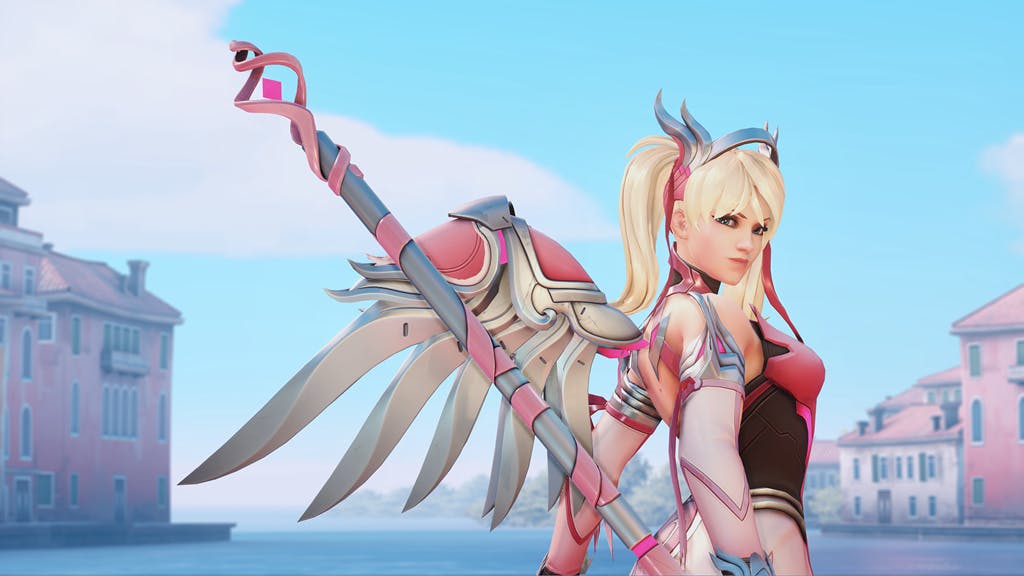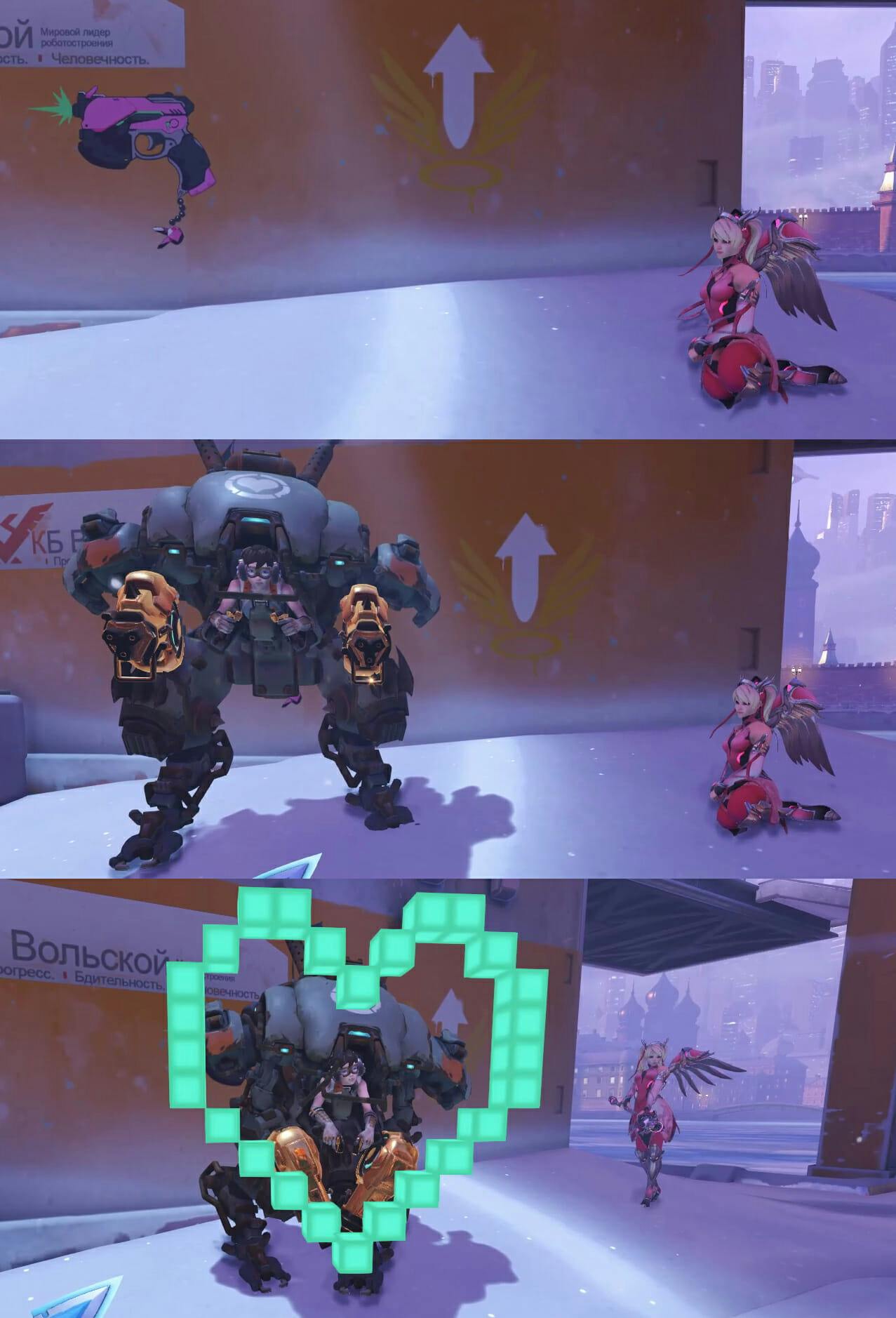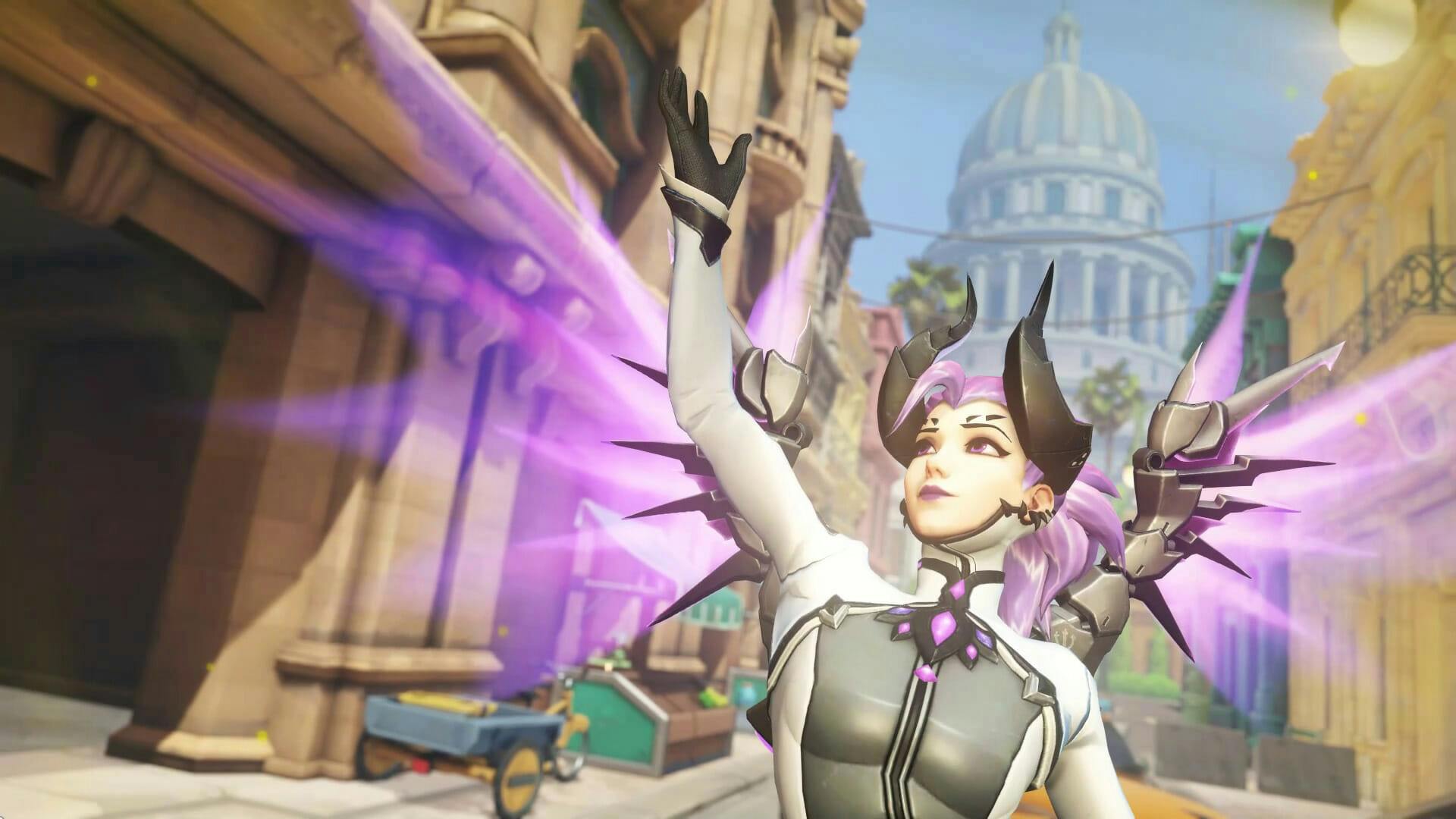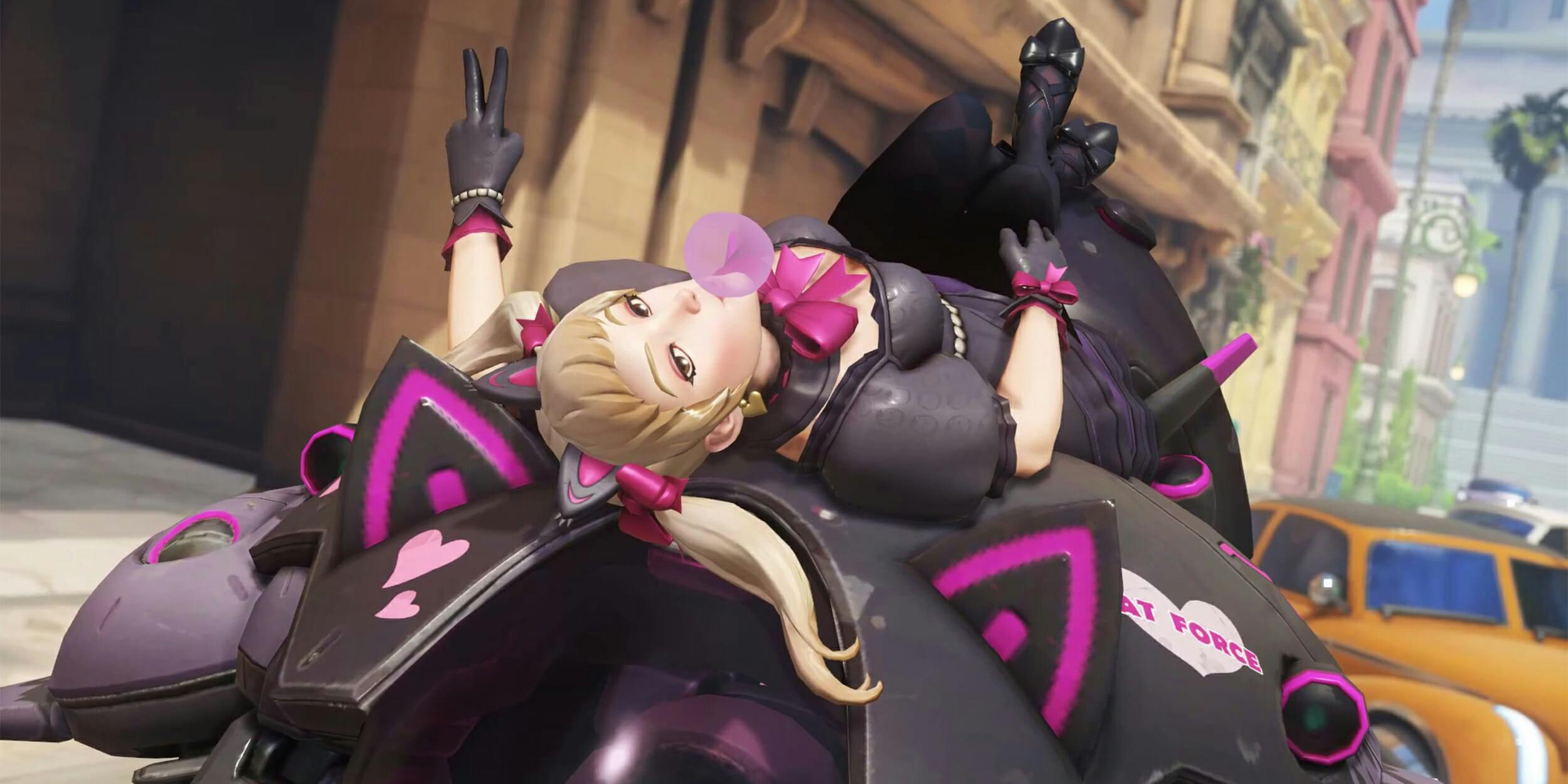It’s hard to think about Overwatch without thinking about Mercy. With a skintight suit, enormous wings, and a halo over her sweep of blonde hair, Mercy is one of Overwatch’s most popular support characters. She can join up with an offensive hero and tend to their every injury, make them more powerful in combat, and resurrect her fallen comrades. She also makes for a good “pocket” healer, keeping one specific player alive throughout the entire game.
In most Overwatch matches, this would be considered the “wrong” way to play Mercy. She’s supposed to heal her entire team, not just a single player. But for healsluts, obedience, reliance, and unyielding attention is the point.
Healslutting is a BDSM dynamic where players take on dominant/submissive roles through in-game characters. Usually, the submissive will play as a healer, while the dominant will play as an offensive character, although this isn’t always the case. Either way, one person submits to the other’s in-game demands for sexual pleasure. But instead of in-person roleplay or online kink sexting, gaming becomes the vehicle for the power exchange between mutually consenting parties.

Healsluts are not just Mercy fans and Overwatch players; they enjoy a wide range of role-playing games, or RPGs like World of Warcraft, Monster Hunter: World, and Final Fantasy XIV. Sexual preferences also vary. Some healsluts play with toys or enjoy healslutting games. Others create their own rules with their play partners. There’s solo healslutting, too. Some refrain from in-game play and just hang out on the Healsluts Discord, roleplaying, kinkposting, or fantasizing about healslutting.
“Some people might assign spanks as punishments, and others might do simpler things,” H.F., a trans woman who is part of the Healsluts Discord, told me. “It’s basically just an extension of BDSM into gaming. You could call it a method of doing long-distance BDSM while hanging out.”
If you’re unfamiliar with BDSM, healslutting may sound weird. But the kink isn’t just about masturbating while playing video games. It’s a powerful outlet for self-discovery and community, one that’s mirrored in every fandom where adult content flourishes.
Sexual fantasies are incredibly important to fandoms, and not just because they’re a fun way to rub one out. Just like in meatspace, we connect to others—and ourselves—through sexual experiences. Sometimes, that’s fantasizing about a character we love. Other times, it’s acting out our deepest desires within our favorite series’ universes to understand our own sexuality and gender.
“Because fandom today is so closely linked to personal identity, and the person we present to the outside world, it means that when we like characters, we like them passionately,” doctoral candidate Emily R. Marlow, who researches sexuality, religion, fan studies, and queer characters in gaming at the University of Sheffield, told me. “And that, in turn, lends to a blurring of the lines of sexual attraction and affection.”
When she was around 18, adult artist Ava Morgan gravitated to fandom porn for the “emotional” and “sentimental attachment” she had to her favorite characters. After joining the Homestuck fandom, she started drawing porn of its characters. While Morgan struggled with her gender identity during those early young adult years, Homestuck erotic roleplays with female/female characters (or F/F pariings) helped her explore both her gender and her kinks in a private and affirming way.
“These online anonymous roleplays provided what felt like a safe outlet to delve further into these kinks and scenarios that I sometimes struggled with in real life,” Morgan told me over email. “If I were to express some of these desires with a partner in real life, for example, it would feel like I was putting the entire validity of my gender identity on the line based on their reaction. But in this anonymous online space, that exploration could be much more consequence-free.”
In roleplay, two or more people meet, create a story with fictional characters, and share a private world together as they interact. In the Healsluts Discord, that includes text roleplays where participants star as their favorite video game characters. While roleplay isn’t inherently sexual, and many engage in roleplays that outright avoid sex, Marlow notes that roleplay lets lonely internet denizens find a sense of comradery.
“There’s always someone who will reach out to another person and affirm with them—there’s never just one person crying alone that they want to do X, there’s like this loud call that always comes,” Marlow explained. “Whether that is specific to erotic fandom, I’m not sure, but I think the mindspaces that are opened within circles of fanfiction and fanart are so valuable, and for a generation as overworked as this audience is, it speaks of a safe space, a resting space.”

Eimi, a trans woman from Kansas, felt “completely awkward and disconnected” from others during high school, partly because of her gender dysphoria. Massively multiplayer online games (MMOs) gave her an avenue for self-expression well before she realized she was transgender. After getting into the MMORPG Final Fantasy XI, she took on the role of a woman in-game and told others she was a girl. She soon entered into a relationship with another player who went by the username Teyah.
“I introduced myself to her as a girl and we hung out for a while, a week or so, but eventually I ended up telling her my story,” Emi says about presenting as a boy prior to her gender transitioning. “She asked me out, and so began that extremely long-term relationship. We were inseparable, or at least I was inseparable from her.”
During their relationship, Eimi had her first online sexual encounter with another Final Fantasy XI player who “played a girl character who had a dick.” She bottomed for that player and learned that “the idea of being fucked rather than doing the fucking” was sexually pleasing to her. While the incident caused major tension between Eimi and Teyah, the two eventually patched things up, and the encounter would influence how the couple had online sex once they started cybering together.
“We started off playing as we were, me as a boy topping her as a woman,” Eimi told me. “However, I really wasn’t satisfied with that. I asked her if I could first play as a woman, and then a woman with a dick. She preferred me topping but was open to topping me, something I begged for more and more. I can remember her making a joke about me preferring anal and saying, ‘Oh, she’d have to do it on me first,’ and I was just like, ‘Sold!’”
I doubt Square Enix designed Final Fantasy XI so its queer players could hook up and go steady. But MMOs are fundamentally social experiences. Eimi had to make friends to play the game. Because users found ways to engage with each other sexually, Final Fantasy XI became more than just a space for play. It became a world where people like Eimi and Teyah could experiment with each other privately and safely. That legacy lives on today through spaces like the Healsluts Discord, where players can use games like Overwatch and League of Legends to explore without shame.
That’s not to say that all online geek communities are utopias for sexual pleasure—especially queer and kinky sexual pleasure. Infighting over adult content is as old as fandom itself. In the 1980s, Lucasfilm insisted on “no pornography” from Star Wars fanzines to prevent “darkening the reputation our company is so proud of.” Fanfiction that sexually paired Han Solo with Luke Skywalker became a flashpoint as fans argued whether Han/Luke stories should be published in the Star Wars fandom’s zines. To this day, it’s still unclear whether the backlash was rooted in homophobia or a desire to stamp out adult content and protect zinesters from Lucasfilm’s hand. Regardless, Han/Luke’s critics won out. The fanfiction pairing remained private for years, only reemerging in the ’90s.
But that was 30 years ago, and the world has changed, right? Beyond the proliferation of adult content online, not really.
In December, Tumblr instituted a sitewide ban on NSFW content, effectively exiling its adult users—and a robust queer, kink community—into various corners of the internet. However, users had already been feeling that Tumblr staffers were “more distant and less responsive” since Yahoo acquired Tumblr in 2013, as Kotaku’s Gita Jackson wrote. Without a steady hand moderating Tumblr’s userbase, many concluded that “the community itself [was] broken.”
These problems weren’t a coincidence. As GeekDad’s Sean Z explains, Tumblr operates on an opt-out tagging system—by default, searching a given tag (such as #avengers) will bring up all content available under that tag. This means if a user feels uncomfortable with an #avengers “ship,” or a fan-derived fictional couple, then the onus was on the user to opt-out of that content with Tumblr’s tag filtering system. This fostered communities that would band together against a ship with their own tags, usually with the prefix “anti-.” Anti-shippers would then attack ships for “problematic” content or promoting a “broadly objectionable thing.” For example, many anti-shippers criticize fictional depictions of non-con (or non-consensual) shipping or artists “aging up” teenage characters into adults.
Marlow connects this “anti” phenomenon back to the K-pop fandom. Because groups like BTS feature idols with highly cultivated public images, this encourages both a “protective” and “defensive” stance among fans about fanart and fanfiction with BTS members.“When that [protective relationship] then interacts with sexuality—via kinks—it becomes personal. It links a certain character (the person being written about) to a particular sexual practice,” Marlow told me. “But it doesn’t link it to just the act, it links them to the entire history of that act that is accessible to the world at that time. The opinion of the world on that act. As such, you get a lot of people with preconceptions about certain kinks, and what they ‘say’ about a person. And people get defensive—because for some of them, that history doesn’t align with their protected mental image of the character.”
It’s easy to see how this same phenomenon plays out in gaming. In September 2016, Kotaku’s Luke Winkie, who has also written for the Daily Dot, penned a story on Overwatch‘s healsluts community, saying healsluts “turn playing support into an erotic experience.” To his credit, Winkie’s article breaks down the healsluts community in a relatively accurate and open-minded way. But his article also feels incredibly voyeuristic. Simultaneously fascinated and surprised that players would sexualize the healer dynamics in Overwatch, Winkie seems to think healsluts represents the weirdest part of the internet: the horny one.

“Overwatch was not built with kink in mind. It’s rated T for Teen,” Winkie wrote. “The developers were so averse to sexualizing their game that they pruned one character’s over-the-shoulder pose from the game for being too risque. But for the venerable ‘healslut’ scene, which is all about the eroticization of playing support roles in games, you’ve got to work with what you’ve got.”
As often happens with online communities built around niche interests, the article wasn’t received well by healsluts. The mod behind Reddit’s r/HealSluts, user LeviathansLust, who was also quoted in the Kotaku piece, stressed he didn’t like the final article, a point he would repeatedly note on the site. “I merely put my word in because it was going to happen anyways,” LeviathansLust wrote after publishing the full Q&A transcript in February 2017. “I thought the article was terrible and did a horrible job portraying the healslut community, but in the end it was exposure. Can’t bark too much when it was a net positive thing.”
He was correct. In September 2016, Kotaku counted 1,600 subscribers to the community’s subreddit and 600 members in its Discord. Now, there are over 34,000 subscribers on Reddit and over 24,000 members on Discord. Complaints aside, Kotaku fostered the healsluts community and exposed it to thousands.
Yet it’s not uncommon to still see players express disgust toward Overwatch’s kinkier players. Just take a peek at the online stalking forum Kiwi Farms, where one mod mocked r/HealSluts by declaring “these people are serious about this shit.”
“Jesus Christ, what the fuck,” another Kiwi Farms user replied. “We’re hitting degeneracy levels that shouldn’t even be possible.”
Then there’s the term “healslut,” literally “heal” plus “slut” combined. In a sexual context, it’s empowering. But when it’s used in a gameplay context, it’s disparaging. It implies two things: Either that a healer is a “slut” who passively does nothing but heal, or the player is a healer who is a “slut” for playing healer characters. The message is obvious: Healers are weak, passive participants in a game. Want to do nothing useful but heal everyone until your team wins? Go play Mercy then, healslut.
“The only healer I don’t have fun playing is Mercy, who my friends and I refer to as healslut only now,” one Overwatch player wrote on the game’s then-official forum in 2017. “With Mercy, you just don’t do ANYTHING. At all. Meanwhile, we don’t refer to Ana and Zen as healsluts, because they do so much more than just heal.”
Is the microaggression subtle? Sure. But sometimes the stigma against kink, fetishism, and queerness in fandom isn’t blatant. It’s carried out through kinkshaming, joking about shippers being creepy, or other messages that turn adult content creators and erotic roleplayers into a laughingstock. Do it enough times, and it goes beyond stigmatizing the kink itself, but dehumanizing the kinkster. In a June 2016 thread on 4chan’s meetup board /soc/, one user called healsluts “dumb ass faggots” who need to “keep that [shit off] while I’m playing fucking Overwatch.” Three months later on Winkie’s Kotaku article, a commentator claimed healsluts are “fucked in the head.”
Not much has changed. In a video from last month, YouTuber UberDanger infiltrates the Healsluts Discord and makes fun of its members’ IMs and voice chats. One bit implies a female healslut has no self-respect for engaging in the kink. Others poke fun at the Healsluts Discord’s trans women. The message is read loud and clear by his viewers: Healsluts are deranged perverts.
Jill is a transgender woman who grew up in a “lower-middle-class-to-poor” household in suburban Minnesota, one she says prevented her from building strong connections with other “nerds.” So instead, she turned to fandoms based around series like Nintendo’s Earthbound and Atlus’ Persona, which introduced her to roleplaying. It was here where she built some of her strongest friendships and where she began doing erotic roleplays.
When I asked her whether the internet gave her a safe and anonymous place to explore herself, she sent me a response in all caps: “YES ABSOLUTELY. YES.”
“I was so uncomfortable in my gender identity—being both trans and a lesbian, and thus somehow simultaneously ‘double queer’ and ‘able to avoid showing obvious signs of it in casual interactions’—that IRL, I kind of shut down emotionally and just went through the motions if a situation highlighted it,” Jill told me over email. “Exploring femininity in a roleplay environment felt safe and affirming—both in terms of [general] and lewd RP—and let me kind of feel out how I related to myself.”
Every source I spoke to echoed Jill’s point: The internet revolutionized their lives and helped them come out of the closet. But let’s take their stories one step further.
If the internet helped each of these queer women discover more about themselves, then fandom—and more specifically, fandoms where people can openly express themselves sexually—gave them the stage they needed to act out their sexual fantasies in a safe and empowering way.
That said, Marlow is quick to point out that online privacy is finite, as “digital identity is often closely linked with the professional self.” But the internet still provides room to work through some of the stigma around issues like queer sexuality, transness, and kink, especially for folks who don’t have access to offline communities.
“[Some users are] isolated—living in rural spaces, and don’t have the option [to engage in kink in real life], or they’re poor, and the internet, where they can access and explore ‘for free’ provides the space cheaply and safely,” Marlow told me. “It’s not utopia, it’s just a larger hall.”
Information is more accessible than ever, and when that includes both fandom and adult content, the internet lets people work through their identity, learn more about themselves, and feel proud of their kinks. But to do that, we have to be allowed to experiment with our sexualities. That means kinkshaming needs to be condemned in fandom, be it in Overwatch or Star Wars.
“I don’t think I’d ever have discovered my gender identity if I had never been as active online as I am,” H.F. told me. “I think that without the internet, I would’ve wallowed in the misery of hating how I look and feel my entire life, and probably not done much of anything with my life, because I would’ve never thought of it as a possibility.”
Correction: A previous version miscounted the members in the Healsluts Discord; it has been updated.
READ MORE:


